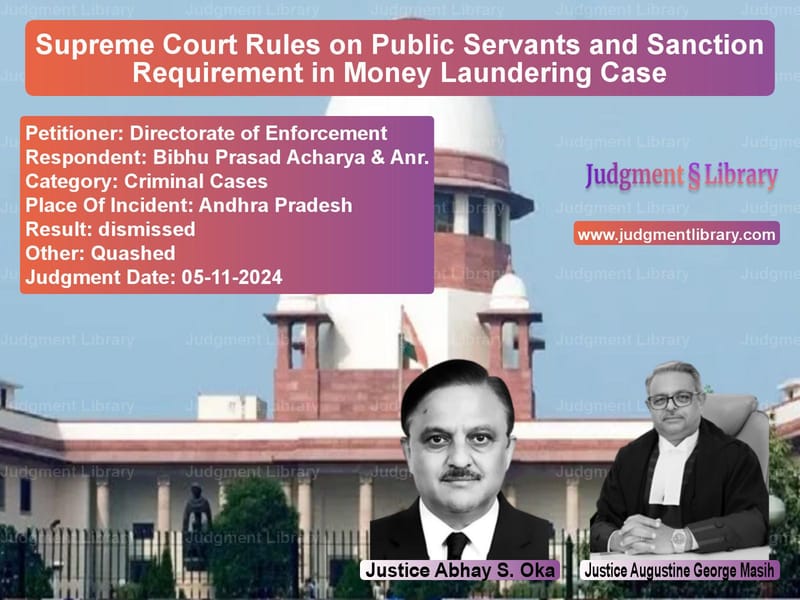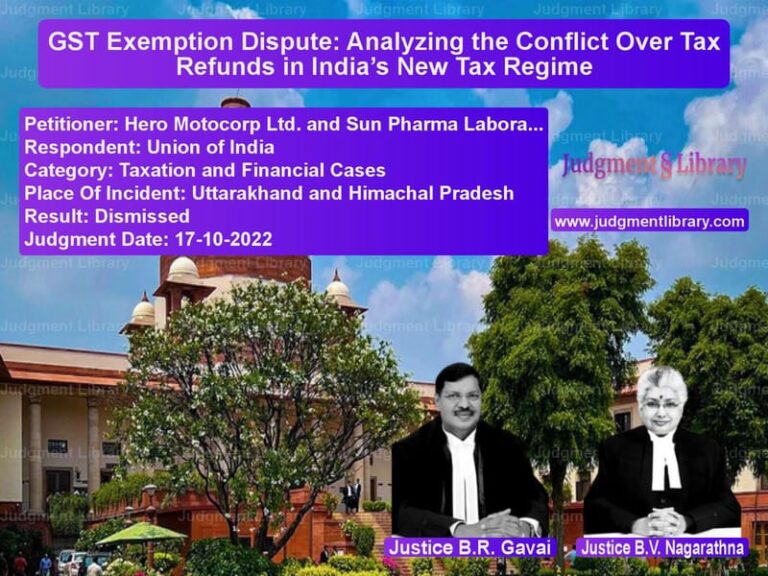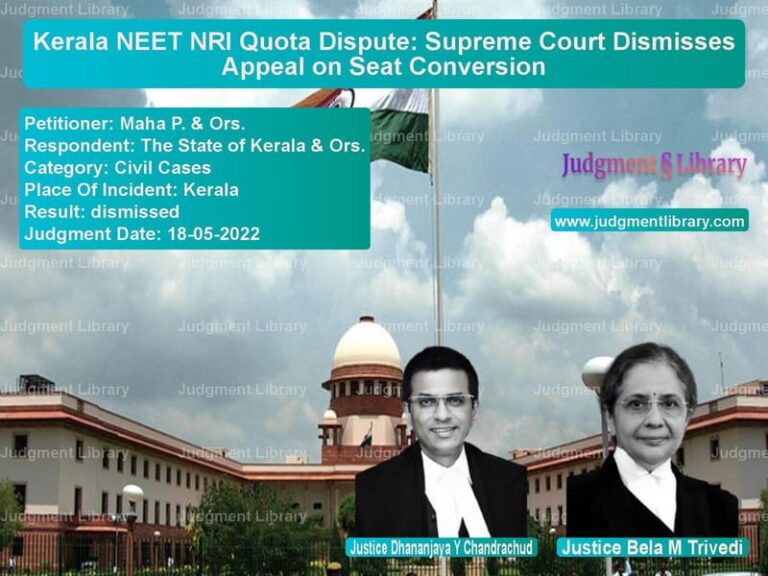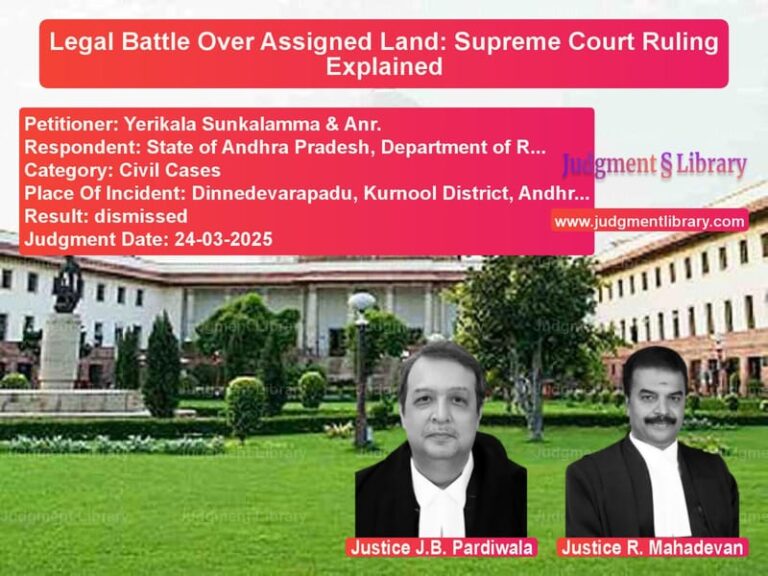Supreme Court Rules on Public Servants and Sanction Requirement in Money Laundering Case
The Supreme Court of India, in Directorate of Enforcement v. Bibhu Prasad Acharya & Anr., addressed a critical legal issue regarding whether public servants require sanction under Section 197 of the Code of Criminal Procedure (CrPC) before prosecution under the Prevention of Money Laundering Act, 2002 (PMLA). The ruling affirmed the necessity of sanction before prosecuting public servants for alleged money laundering offenses committed in the discharge of official duties.
Background of the Case
The Enforcement Directorate (ED) initiated proceedings against Bibhu Prasad Acharya (Vice Chairman and Managing Director of Andhra Pradesh Industrial Infrastructure Corporation) and Adityanath Das (Principal Secretary, I&CAD Department, Andhra Pradesh) under Section 3 of the PMLA. The accusations stemmed from alleged irregularities in land allotments and water allocations benefiting private corporations, purportedly as part of a conspiracy.
The respondents challenged the criminal proceedings, arguing that they were public servants under Section 197(1) of the CrPC and, therefore, required sanction from the government before prosecution. The High Court upheld this argument and quashed the cognizance taken against them, leading to the ED’s appeal before the Supreme Court.
Read also: https://judgmentlibrary.com/supreme-court-acquits-man-in-1989-murder-case-due-to-lack-of-evidence/
Key Legal Issues
- Does the PMLA override the CrPC’s requirement for sanction before prosecuting public servants?
- Do the acts alleged against the respondents fall within the scope of their official duties?
- Can prosecution proceed against a public servant without prior government approval?
Arguments of the Appellant (Enforcement Directorate)
- Section 71 of the PMLA provides overriding effect over other statutes, including the CrPC, making prior sanction unnecessary.
- The acts of the respondents (irregular land allotments and water allocations) were not part of their official duties but acts of corruption.
- Government officials engaging in money laundering cannot claim protection under Section 197(1) of the CrPC.
Arguments of the Respondents (Public Servants)
- Their actions were performed in an official capacity, and prosecution without prior sanction would violate statutory protection under the CrPC.
- They were public servants appointed by the state government and removable only by or with its approval.
- Previous judicial rulings established that criminal proceedings against public servants require prior sanction.
Supreme Court’s Observations
On the Requirement of Sanction
The Court examined Section 197 of the CrPC, which provides that a public servant cannot be prosecuted without prior sanction if the offense was committed in the discharge of official duty. The Court held:
“The legislative intent behind Section 197 of the CrPC is to protect public servants from unnecessary harassment, ensuring that they are not prosecuted for acts performed in the discharge of their duties.”
On the Application of the PMLA
The ED argued that Section 71 of the PMLA overrides the CrPC, making sanction irrelevant. However, the Court ruled:
- Section 65 of the PMLA states that the CrPC applies to PMLA cases unless inconsistent with its provisions.
- No provision in the PMLA directly overrides Section 197 of the CrPC.
- The requirement of sanction is not inconsistent with the PMLA’s objectives and must be adhered to.
On the Nature of the Alleged Offense
The Court found that the alleged offenses—land allotment and water allocation decisions—were made in an official capacity, even if misused. It observed:
“If the alleged act is reasonably connected to official duties, the protection under Section 197 applies. The question of whether it was misused is for the trial court to decide.”
Final Judgment
The Supreme Court dismissed the ED’s appeal and upheld the High Court’s ruling. It held:
- Sanction under Section 197(1) of the CrPC is required before prosecuting public servants under the PMLA.
- Without such sanction, the trial court cannot take cognizance of the case.
- The ED is free to seek government sanction and reinitiate prosecution if approval is granted.
Implications of the Judgment
- Reaffirms that public servants are entitled to statutory protection under the CrPC.
- Ensures that prosecution of government officials under the PMLA follows due process.
- Clarifies the relationship between special statutes like the PMLA and procedural safeguards in the CrPC.
This ruling provides crucial guidance on balancing anti-corruption efforts with legal protections for public officials, ensuring that investigative agencies adhere to procedural requirements.
Petitioner Name: Directorate of Enforcement.Respondent Name: Bibhu Prasad Acharya & Anr..Judgment By: Justice Abhay S. Oka, Justice Augustine George Masih.Place Of Incident: Andhra Pradesh.Judgment Date: 05-11-2024.
Don’t miss out on the full details! Download the complete judgment in PDF format below and gain valuable insights instantly!
Download Judgment: directorate-of-enfor-vs-bibhu-prasad-acharya-supreme-court-of-india-judgment-dated-05-11-2024.pdf
Directly Download Judgment: Directly download this Judgment
See all petitions in Money Laundering Cases
See all petitions in Fraud and Forgery
See all petitions in Corporate Compliance
See all petitions in Public Sector Employees
See all petitions in unfair trade practices
See all petitions in Judgment by Abhay S. Oka
See all petitions in Judgment by Augustine George Masih
See all petitions in dismissed
See all petitions in Quashed
See all petitions in supreme court of India judgments November 2024
See all petitions in 2024 judgments
See all posts in Criminal Cases Category
See all allowed petitions in Criminal Cases Category
See all Dismissed petitions in Criminal Cases Category
See all partially allowed petitions in Criminal Cases Category







